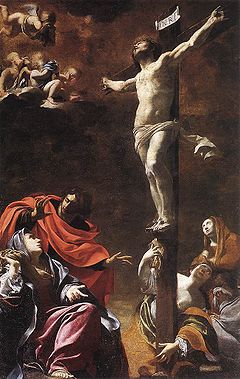Christ is Risen! Alleluia!
A very blessed Day of Resurrection to you, my friends!
Can I just say that I LOVE Easter!? It's my very favorite day of the year, and the holiest day of the Christian calendar. I guess it's the retired actor in me, but I love the Church's liturgy of acting out the passion and resurrection story of Jesus. Every year, we get to make this story real to us by acting it out in our public worship. Last Sunday we waved the palm branches which greeted Christ on his entry into Jerusalem. On Thursday we washed the feet and ate the meal, then we stripped the altar in solemn remembrance of the betrayal, abandonment, arrest, beating, and mockery which Jesus endured that night. The following evening we told the story of his trial and death on the cross, slowly extinguishing the lights until we sat in the darkness of a world without redeeming love.
But then this morning came. Like the women in the gospels I arose in the darkness of early morning. And, as I have for the last fifteen years, I came to a garden to meet with fellow believers and praise the goodness of God.
Sunshine or rain, tornado, or blizzard, year after year, about 100 or more Philadelphia Christians gather on the banks of the Delaware River and sing to the rising sun. We are Lutherans and Episcopalians, Baptists and Methodists, Roman Catholics and United Church of Christ and every other Christian denomination. On this morning, our tiny doctrinal differences don't matter to us.
We are clergy and laity, black and white, old and young, straight and gay. We are ALL believers in the deliverance made known to the world in Jesus Christ, the immortality of our souls, the goodness of God, and the call to love one another for the healing of the world.
We sing contemporary songs, but we sing the old hymns too. Sometimes, in those old, well-remembered words, I can almost feel the spirits of the departed singing with us from Heaven. We pray together. We acknowledge our faults. We jointly proclaim the beliefs which bind us together. And, year after year, the riverbank is a place of joy and love among neighbors and strangers.
For me, it is always the singing. I love to sing, and I love to hear people sing. In this mp3 player generation, how wonderful it is to hear people stand together and just sing.
Sing we to our God above, Alleluia!
Praise eternal as his love: Alleluia!
Praise him all you heav'nly host, Alleluia!
Father, Son, and Holy Ghost, Alleluia!
May Easter's joy fill your hearts! Thanks for reading.
P.S.-I have but one lament: Our ecumenical worship this morning did not include the celebration of the Holy Eucharist. Unfortunately, our Roman Catholic brothers and sisters are not yet permitted by their doctrine to join with the rest of us. Pray that the new Pope will soon invite ALL Christians to the table of the Lord and that our fellowship will be complete.
P.S.-I have but one lament: Our ecumenical worship this morning did not include the celebration of the Holy Eucharist. Unfortunately, our Roman Catholic brothers and sisters are not yet permitted by their doctrine to join with the rest of us. Pray that the new Pope will soon invite ALL Christians to the table of the Lord and that our fellowship will be complete.


